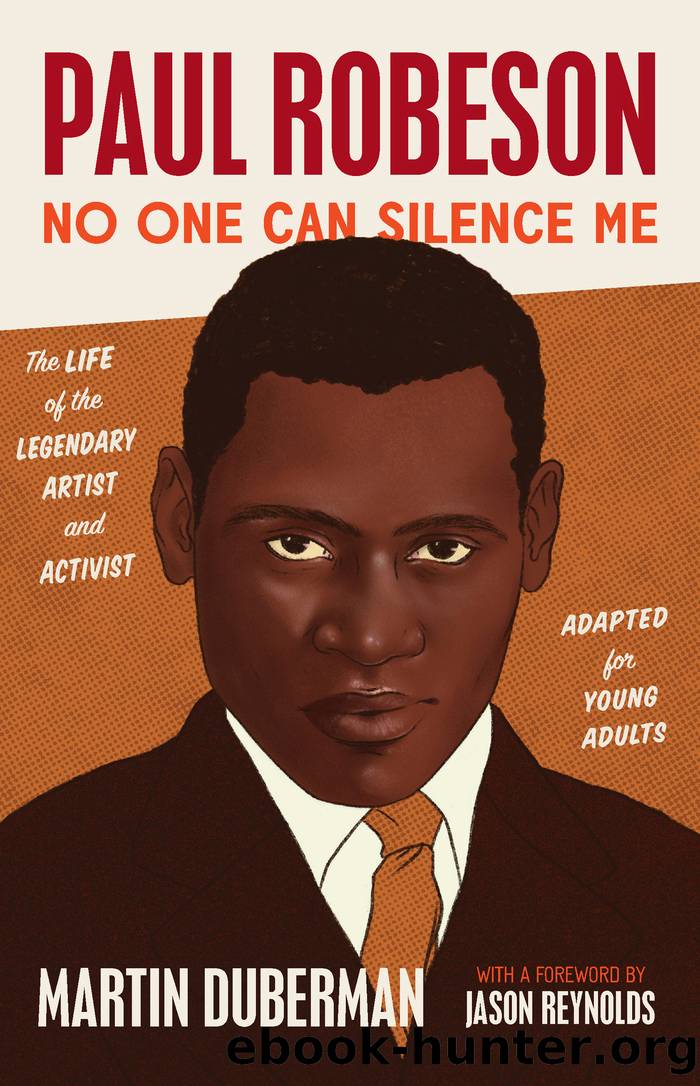Paul Robeson: No One Can Silence Me: The Life of the Legendary Artist and Activist (Adapted for Young Adults) by Martin Duberman

Author:Martin Duberman [Duberman, Martin]
Language: eng
Format: epub
Tags: Young Adult Nonfiction, Biography & Autobiography, Social Activists, Cultural; Ethnic & Regional, Performing Arts, history, United States, 20th Century, People & Places, African American & Black
ISBN: 9781620976616
Google: jSXxDwAAQBAJ
Publisher: The New Press
Published: 2021-03-09T23:38:58.219520+00:00
âIâm Looking for Freedomâ
When Robeson returned to the United States from Moscow in June 1949, the Council on African Affairs, which he chaired, staged a âWelcome Homeâ rally at the Rockland Palace in Harlem. Some five thousand fans, roughly half of them white, showed up to cheer his return. And he gave them their moneyâs worth in one of the most powerful speeches of his career. âI defy any part of an insolent, dominating America, however powerful,â he said. âI defy any errand boys, Uncle Toms of the Negro people, to challenge my Americanism because by word and deed I challenge this vicious system to the death. Iâm looking for freedomâfull freedom, not an inferior brand.â
Most Black Americans, he insisted, unlike some of their leaders, were ânot afraid of their radicals who point out the awful, indefensible truth of our degradation and exploitation. ⦠How Sojourner Truth, Harriet Tubman, and Frederick Douglass must be turning in their graves at this spectacle of a craven, fawning, despicable leadership.â
In thunderous tones Robeson went on to denounce the continued enslavement of colonial peoples and the betrayal of the Black American worker by some white labor leaders. He insisted that Black Americans âmust have the courage to shout at the top of our voices about our injustices and we must lay the blame where it belongs and where it has belonged for over three hundred years of slavery and miseryâright here on our own doorstep, not in any faraway place. ⦠We do not want to die in vain any more on foreign battlefields for Wall Street and the greedy supporters of domestic fascism. If we must die, let it be in Mississippi or Georgia. Let it be wherever we are lynched and deprived of our rights as human beings.â
Despite his challenging words, by the late 1940s Robeson felt increasingly penned in, no longer able to count on an admiring audience. Congressâs House Un-American Activities Committee (HUAC) soon made that clear. Within weeks of his speech they subpoenaed him to give testimony.
When the day arrived, HUAC first called to the stand half a dozen Black witnesses hostile to Robeson. Alvin Stokes, a Black investigator for HUAC, claimed that the communists were planning to set up a Soviet republic in the Deep South and that âRobesonâs voice was the voice of the Kremlinâ (the seat of the Soviet government). Next up was Manning Johnson, a Black anticommunist and professional informer whoâd done his mastersâ bidding in a number of earlier âloyaltyâ cases. He declared flatly and falsely that Robeson was a signed-up member of the Communist Party USA, had âdelusions of grandeur,â and wanted to become âthe Black Stalin.â
Johnson was followed by several more prominent Black citizens. Thomas W. Young, president of the Norfolk Journal and Guide, declared that Robeson had broken the bond he once had with Black people and had âdone a great disservice to his raceâfar greater than that done to his country.â Lester Granger, head of the Urban League, whoâd already
Download
This site does not store any files on its server. We only index and link to content provided by other sites. Please contact the content providers to delete copyright contents if any and email us, we'll remove relevant links or contents immediately.
Machine Learning at Scale with H2O by Gregory Keys | David Whiting(4295)
Never by Ken Follett(3937)
Fairy Tale by Stephen King(3370)
Will by Will Smith(2911)
Fantastic Beasts and Where to Find Them: The Original Screenplay by J. K. Rowling(2510)
It Starts With Us (It Ends with Us #2) by Colleen Hoover(2344)
Can't Hurt Me: Master Your Mind and Defy the Odds - Clean Edition by David Goggins(2324)
The Storyteller by Dave Grohl(2229)
Friends, Lovers, and the Big Terrible Thing by Matthew Perry(2219)
The Becoming by Nora Roberts(2189)
Cloud Cuckoo Land by Anthony Doerr(2102)
New Morning Mercies: A Daily Gospel Devotional by Paul David Tripp(1917)
A Short History of War by Jeremy Black(1842)
HBR's 10 Must Reads 2022 by Harvard Business Review(1840)
The Complete Witcher by Andrzej Sapkowski(1835)
Cytonic by Brandon Sanderson(1831)
Go Tell the Bees That I Am Gone by Diana Gabaldon(1754)
Leviathan Falls (The Expanse Book 9) by James S. A. Corey(1727)
A Game of Thrones (The Illustrated Edition) by George R. R. Martin(1722)
